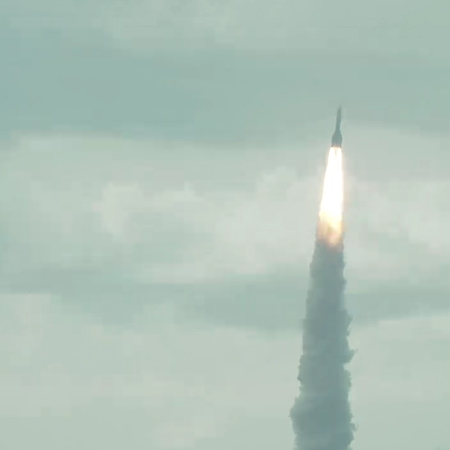Europe at last launches Ariane-6

Ariane-6 seconds after liftoff
Arianespace, the commercial rocket arm of the European Space Agency (ESA) today successfully completed the first launch of its new Ariane-6 rocket, lifting off from French Guiana in South America carrying nine cubesats plus two re-entry test capsules.
As of posting, the nine cubesats have been deployed. Of the remaining payloads, one is a smallscale version of the return cargo capsule being built by the French company The Exploration Company. It will test the re-entry technology for that capsule.
UPDATE: There was an issue restarting the upper stage later in the flight that prevented the last payloads from being released. The bigwigs at the press conference at this link repeatedly insisted the flight was a complete success, but this failure of the upper stage is not a good thing, but hardly a disaster. It is similar to problems Firefly had on some of its early flights, which the company was able to overcome.
If all goes as planned, Arianespace and Arianegroup (the private company that builds and owns the rocket) hope to ramp up launches over the next three years, doing one more in 2024, six in 2025, eight in 2026, and ten in 2027. It says the rocket has contracts for thirty launches, eighteen of which are for launching Amazon’s Kuiper internet constellation.
I expect Ariane-6 to face heavy competitive pressure over that time period, not only from SpaceX but from the new European rocket startups that should begin launching at far less cost. The pressure should make the future of Ariane-6 somewhat dim, unless the European Union steps in and mandates its use by European satellite companies. If the latter happens, expect Europe’s entire space industry to suffer badly.
This was Europe’s first launch in 2024, so the leader board in the 2024 launch race has not changed:
71 SpaceX
30 China
8 Russia
8 Rocket Lab
American private enterprise still leads the world combined in successful launches, 83 to 46, while SpaceX by itself still leads the entire world, including other American companies, 71 to 58.

Ariane-6 seconds after liftoff
Arianespace, the commercial rocket arm of the European Space Agency (ESA) today successfully completed the first launch of its new Ariane-6 rocket, lifting off from French Guiana in South America carrying nine cubesats plus two re-entry test capsules.
As of posting, the nine cubesats have been deployed. Of the remaining payloads, one is a smallscale version of the return cargo capsule being built by the French company The Exploration Company. It will test the re-entry technology for that capsule.
UPDATE: There was an issue restarting the upper stage later in the flight that prevented the last payloads from being released. The bigwigs at the press conference at this link repeatedly insisted the flight was a complete success, but this failure of the upper stage is not a good thing, but hardly a disaster. It is similar to problems Firefly had on some of its early flights, which the company was able to overcome.
If all goes as planned, Arianespace and Arianegroup (the private company that builds and owns the rocket) hope to ramp up launches over the next three years, doing one more in 2024, six in 2025, eight in 2026, and ten in 2027. It says the rocket has contracts for thirty launches, eighteen of which are for launching Amazon’s Kuiper internet constellation.
I expect Ariane-6 to face heavy competitive pressure over that time period, not only from SpaceX but from the new European rocket startups that should begin launching at far less cost. The pressure should make the future of Ariane-6 somewhat dim, unless the European Union steps in and mandates its use by European satellite companies. If the latter happens, expect Europe’s entire space industry to suffer badly.
This was Europe’s first launch in 2024, so the leader board in the 2024 launch race has not changed:
71 SpaceX
30 China
8 Russia
8 Rocket Lab
American private enterprise still leads the world combined in successful launches, 83 to 46, while SpaceX by itself still leads the entire world, including other American companies, 71 to 58.

